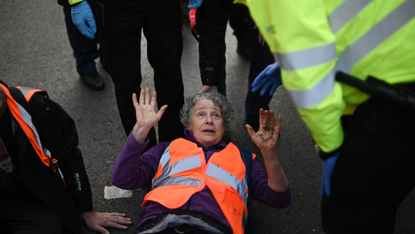Insulate Britain: what the protesters want
Motorists assault demonstrators as disruption to Britain’s road network continues

Climate campaign group Insulate Britain has been blocking major roads across the UK every day for more than two weeks.
Its campaigning tactics have proved controversial, with members standing in the middle of busy motorways and others gluing themselves to tarmac, causing significant traffic disruption. The group is calling on the government to make a commitment to insulate Britain’s homes by 2030 in order to tackle climate change.
The demonstrations took an “utterly bizarre” turn on Wednesday, as a motorist in Dartford “started playing bagpipes in protestors’ faces before police moved him off”, tweeted Sky News correspondent Ivor Bennett.
Subscribe to The Week
Escape your echo chamber. Get the facts behind the news, plus analysis from multiple perspectives.

Sign up for The Week's Free Newsletters
From our morning news briefing to a weekly Good News Newsletter, get the best of The Week delivered directly to your inbox.
From our morning news briefing to a weekly Good News Newsletter, get the best of The Week delivered directly to your inbox.
The “fed-up motorist” had been stuck in traffic as campaigners blocked the road, said indy100.
Other angry drivers have taken to dragging protesters off the road, while activists in Acton had ink thrown in their faces. One man, a retired 77-year-old doctor, covered in ink, told Greatest Hits Radio that though “it didn’t hurt, it was unpleasant”.
“It’s just sad,” he continued. “I’ve spent my life trying to help people and I’m reduced to having to do this because the government won’t address the problem adequately.”
Injunctions have been granted to prevent the protesters from demonstrating on England’s strategic road network. On Monday, Transport Secretary Grant Shapps said he was making use of “every avenue of existing law to try to prevent the continued life-endangering action” of the group. Insulate Britain called the injunction a “massive overreach”.
Demonstrator Benjamin Buse told The Guardian the group have had to resort to such tactics because “everything else has failed”.
“We know disruption causes political pressure, which gets media attention and government attention,” he said. Insulate Britain estimates that 690 arrests of its members have been made since 13 September.
The group had previously apologised for the disruption caused by their actions after Boris Johnson referred to them as “irresponsible crusties”, on LBC.
Group origins
Insulate Britain is an “offshoot” of climate change protest group Extinction Rebellion (XR), reported ITV News.
The smaller group’s Facebook page confirms that Insulate Britain was “set up by people in XR and related networks”. But while both use similar tactics of mass disruption and civil disobedience, the two groups are not officially affiliated.
Insulate Britain has been holding campaign meetings “since at least June 2021”, said LBC, and was “officially formed” in August.
Their aims
The campaigners are demanding the government perform a retrofit of all UK homes to make them more energy-efficient, in order to meet the UK climate change targets under the Paris Agreement.
According to the Insulate Britain website, the nation’s 29 million homes are “the oldest and least energy-efficient housing stock in Europe”, with almost 15% of the UK’s total emissions coming from heating homes.
The UK “needs a nationwide programme to upgrade almost every house”, said the activists, but the government “does not have a robust long-term national strategy with a funding mechanism in place to retrofit our homes”.
Insulate Britain has launched a petition listing two key demands to be met by Downing Street before the protests stop:
- Fully fund and take responsibility for the insulation of all social housing in Britain by 2025.
- Produce within four months a legally binding national plan to fund and take responsibility for the full insulation retrofit, with no externalised costs, of all homes in Britain by 2030.
The response
According to recent YouGov polling, the British public is far from fond of the group - only 16% had either a “very favourable” or “somewhat favourable” opinion of the protesters, while 53% had either a “somewhat unfavourable” or “very unfavourable” opinion of them.
Some high-profile figures have backed the group, however. Green MP Caroline Lucas told Sky News in September that her party “believes non-violent direct action is legitimate when other forms of trying to raise issues with the government have failed”.
“In emergency situations, we need to take emergency action and I believe that's what those protesters were doing,” the former Green leader added.
Despite that argument, blocking roads is clearly going to “alienate some people”, wrote Oscar Berglund, a social policy lecturer at the University of Bristol, and Graeme Hayes, a reader in political sociology at Aston University, on The Conservation.
“But it’s still likely to be effective”, the two academics argue. The activists recognise that traditional protest methods like “strikes, sit-ins, occupations and blockades have proven more likely to achieve some degree of success than less disruptive protests such as marches, demos or petitions”.
So while they may not be “popular”, the pair conclude, the group is willing to “take the hit” to “get home insulation in the news and up the government’s agenda”.
Create an account with the same email registered to your subscription to unlock access.
Sign up for Today's Best Articles in your inbox
A free daily email with the biggest news stories of the day – and the best features from TheWeek.com
-
 Italian senate passes law allowing anti-abortion activists into clinics
Italian senate passes law allowing anti-abortion activists into clinicsUnder The Radar Giorgia Meloni scores a political 'victory' but will it make much difference in practice?
By Chas Newkey-Burden, The Week UK Published
-
 Magazine interactive crossword - May 3, 2024
Magazine interactive crossword - May 3, 2024Puzzles and Quizzes Issue - May 3, 2024
By The Week US Published
-
 Magazine solutions - May 3, 2024
Magazine solutions - May 3, 2024Puzzles and Quizzes Issue - May 3, 2024
By The Week US Published
-
 What is cloud seeding and did it cause Dubai's severe rainfall?
What is cloud seeding and did it cause Dubai's severe rainfall?The Explainer The future is flooded
By Devika Rao, The Week US Published
-
 Ottawa climate talks: can global plastic problem be solved?
Ottawa climate talks: can global plastic problem be solved?In the spotlight Nations aim to draft world's first treaty on plastic pollution, but resistance from oil- and gas-producing countries could limit scope
By Harriet Marsden, The Week UK Published
-
 What is rock flour and how can it help to fight climate change?
What is rock flour and how can it help to fight climate change?The Explainer Glacier dust to the rescue
By Devika Rao, The Week US Published
-
 Arid Gulf states hit with year's worth of rain
Arid Gulf states hit with year's worth of rainSpeed Read The historic flooding in Dubai is tied to climate change
By Peter Weber, The Week US Published
-
 The growing thirst for camel milk
The growing thirst for camel milkUnder the radar Climate change and health-conscious consumers are pushing demand for nutrient-rich product – and the growth of industrialised farming
By Harriet Marsden, The Week UK Published
-
 Why curbing methane emissions is tricky in fight against climate change
Why curbing methane emissions is tricky in fight against climate changeThe Explainer Tackling the second most significant contributor to global warming could have an immediate impact
By Richard Windsor, The Week UK Published
-
 How the EU undermines its climate goals with animal farming subsidies
How the EU undermines its climate goals with animal farming subsidiesUnder the radar Bloc's agricultural policy incentivises carbon-intensive animal farming over growing crops, despite aims to be carbon-neutral
By Harriet Marsden, The Week UK Published
-
 Why are people and elephants fighting in Sri Lanka?
Why are people and elephants fighting in Sri Lanka?Under The Radar Farmers encroaching into elephant habitats has led to deaths on both sides
By Chas Newkey-Burden, The Week UK Published